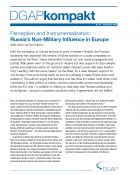Series opener: Stefan Meister and Jana Puglierin, “Perception and Exploitation:Russia’s Non-Military Influence in Europe”
Dániel Hegedüs, “The Kremlin’s Influence in Hungary: Are Russian Vested Interests Wearing Hungarian National Colors?”
Claire Demesmay, “French Susceptibility to Russian Propaganda: ‘There are Always Two Sides to the Truth’”
Julian Rappold, “In Search of Alternatives: Greece between European Frustration and Russian Temptation”
Sarah Wohlfeld “Headed for Brussels without a Compass: Serbia’s Position between Rapprochement with the EU and Russian Influence”
From Stefan Meister and Jana Puglierin's Introduction:
In the context of the Ukraine crisis and the annexation of Crimea, Moscow has deployed instruments of hybrid warfare on a broad scale. These tools include support for Euroskeptic parties and politicians within the EU. The power elite feels justified in using "the same means” as the West; it sees Western support for civil society in the post-Soviet realm as part of a strategy to keep Russia down.
After the Russian invasion of Crimea and its activities in eastern Ukraine in 2014, the term “hybrid warfare” became a buzzword both in European political circles and in the public sphere. Russia’s annexation of neighboring territory with the help of “little green men,” and its deliberate instigation of violent conflict through the infiltration of separatists in eastern Ukraine took the West completely by surprise. Although “hybrid warfare” is by no means a new phenomenon, scholars and politicians are still having difficulty agreeing on what exactly constitutes Russian “hybrid warfare” – let alone what the appropriate response should be.
A question of particular interest is whether Russia’s “soft,” non-military influence in the post-Soviet region and the European Union – be it Russian foreign media such as the television broadcaster RT (Russia Today) or the media platform Sputnik, the targeted expansion of informal financial networks or the funding and support of left- and right-wing populist parties and organizations in the EU – constitutes a further “facet” of hybrid warfare. The most intensely debated topic in this context has been Russian “information warfare,” whose aim is to influence public discussion, especially in EU member states.
The Russian government claims that in this it is merely copying the instruments and techniques that the West itself considers legitimate for the purpose of promoting democracy in Russia and the post-Soviet states. Thus the main aim of the EU’s European Neighborhood Policy is to establish a “ring of friends” around the EU and encourage them to modernize their political, economic, and social policies in a way that harmonizes with the EU model. To this purpose, the EU uses soft power to try to strengthen the civil societies in those countries, support independent media, and help the democratic transformation process expand to the east. This policy is in direct conflict with the interests of the Russian leadership and its remaining post-Soviet partners because it could weaken the hitherto dominant model of authoritarian rule. Naturally, Moscow is afraid of losing power in its sphere of influence.
From the point of view of Russian security policy, then, the country’s expansion and implementation of hybrid or non-linear warfare and soft power is primarily a reaction to the West’s pressure on Russia and Russia’s position in the post-Soviet realm, but one that makes use of Western tools and methods.
Here we examine how Russia itself perceives the expansion of its zone of influence through non-military means, what methods and instruments it employs to advance the expansion, and what dangers result for the West. Finally, we suggest strategies that the EU can pursue to protect itself. As the first in a series of analyses examining Russia’s influence in European countries, this article explains the conceptual framework of Russian non-military influence for the analyses to come. Additional articles will examine a number of individual case studies. Continue reading here.
